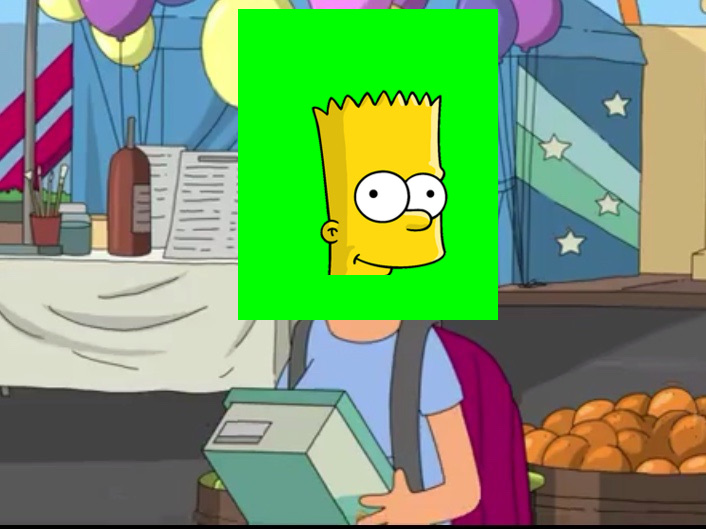
Back in June I’ve played a bit with subtitles and tried to generate a filmstrip, it wasn’t that much successful, but it was fun. So I decided to try to go deeper and generate a video from subtitles. The main idea is to get phrases from a part of some video, get the most similar phrases from another video and generate something.
As the “enemy” I’ve decided to use a part from Bob’s Burgers Tina-rannosaurus Wrecks episode:
As the source, I’ve decided to use The Simpsons, as they have a lot of episodes and Simpsons Already Did It whatever. I somehow have 671 episode and managed to get perfectly matching subtitles for 452 of them.
TLDR: It was fun, but the result is meh at best:
Initially, I was planning to use Friends and Seinfeld but the result was even worse.
As the first step I’ve parsed subtitles (boring, available in the gist) and created a mapping from phrases and “captions” (subtitles parts with timing and additional data) and a list of phrases from all available subtitles:
data_text2captions = defaultdict(lambda: [])
for season in root.glob('*'):
if season.is_dir():
for subtitles in season.glob('*.srt'):
for caption in read_subtitles(subtitles.as_posix()):
data_text2captions[caption.text].append(caption)
data_texts = [*data_text2captions]
>>> data_text2captions["That's just a dog in a spacesuit!"]
[Caption(path='The Simpsons S13E06 She of Little Faith.srt', start=127795000, length=2544000, text="That's just a dog in a spacesuit!")]
>>> data_texts[0]
'Give up, Mr. Simpson! We know you have the Olympic torch!'
After that I’ve found subtitles for the Bob’s Burgers episode and manually selected parts from the part of the episode that I’ve used as the “enemy” and processed them in a similar way:
play = [*read_subtitles('Bobs.Burgers.S03E07.HDTV.XviD-AFG.srt')][1:54]
play_text2captions = defaultdict(lambda: [])
for caption in play:
play_text2captions[caption.text].append(caption)
play_texts = [*play_text2captions]
>>> play_text2captions[ 'Who raised you?']
[Caption(path='Bobs.Burgers.S03E07.HDTV.XviD-AFG.srt', start=118605000, length=1202000, text='Who raised you?')]
>>> play_texts[0]
"Wow, still can't believe this sale."
Then I’ve generated vectors for all phrases with TensorFlow’s The Universal Sentence Encoder and used cosine similarity to get most similar phrases:
module_url = "https://tfhub.dev/google/universal-sentence-encoder/2"
embed = hub.Module(module_url)
vec_a = tf.placeholder(tf.float32, shape=None)
vec_b = tf.placeholder(tf.float32, shape=None)
normalized_a = tf.nn.l2_normalize(vec_a, axis=1)
normalized_b = tf.nn.l2_normalize(vec_b, axis=1)
sim_scores = -tf.acos(tf.reduce_sum(tf.multiply(normalized_a, normalized_b), axis=1))
def get_similarity_score(text_vec_a, text_vec_b):
emba, embb, scores = session.run(
[normalized_a, normalized_b, sim_scores],
feed_dict={
vec_a: text_vec_a,
vec_b: text_vec_b
})
return scores
def get_most_similar_text(vec_a, data_vectors):
scores = get_similarity_score([vec_a] * len(data_texts), data_vectors)
return data_texts[sorted(enumerate(scores), key=lambda score: -score[1])[3][0]]
with tf.Session() as session:
session.run([tf.global_variables_initializer(), tf.tables_initializer()])
data_vecs, play_vecs = session.run([embed(data_texts), embed(play_texts)])
data_vecs = np.array(data_vecs).tolist()
play_vecs = np.array(play_vecs).tolist()
similar_texts = {play_text: get_most_similar_text(play_vecs[n], data_vecs)
for n, play_text in enumerate(play_texts)}
>> similar_texts['Is that legal?']
"- [Gasping] - Uh, isn't that illegal?"
>>> similar_texts['(chuckling): Okay, okay.']
'[ Laughing Continues ] All right. Okay.
Looks kind of relevant, right? Unfortunately only phrase by phrase.
After that, I’ve cut parts of The Simpsons episodes for matching phrases. This part was a bit complicated, because without a force re-encoding (with the same encoding) and setting a framerate (with kind of the same framerate with most of the videos) it was producing unplayable videos:
def generate_parts():
for n, caption in enumerate(play):
similar = similar_texts[caption.text]
similar_caption = sorted(
data_text2captions[similar],
key=lambda maybe_similar: abs(caption.length - maybe_similar.length),
reverse=True)[0]
yield Part(
video=similar_caption.path.replace('.srt', '.mp4'),
start=str(timedelta(microseconds=similar_caption.start))[:-3],
end=str(timedelta(microseconds=similar_caption.length))[:-3],
output=Path(output_dir).joinpath(f'part_{n}.mp4').as_posix())
parts = [*generate_parts()]
for part in parts:
call(['ffmpeg', '-y', '-i', part.video,
'-ss', part.start, '-t', part.end,
'-c:v', 'libx264', '-c:a', 'aac', '-strict', 'experimental',
'-vf', 'fps=30',
'-b:a', '128k', part.output])
>>> parts[0]
Part(video='The Simpsons S09E22 Trash of the Titans.mp4', start='0:00:31.531', end='0:00:03.003', output='part_0.mp4')
And at the end I’ve generated a special file for the FFmpeg concat and concatenated the generated parts (also with re-encoding):
concat = '\n'.join(f"file '{part.output}'" for part in parts) + '\n'
with open('concat.txt', 'w') as f:
f.write(concat)
➜ cat concat.txt | head -n 5
file 'parts/part_0.mp4'
file 'parts/part_1.mp4'
file 'parts/part_2.mp4'
file 'parts/part_3.mp4'
file 'parts/part_4.mp4'
call(['ffmpeg', '-y', '-safe', '0', '-f', 'concat', '-i', 'concat.txt',
'-c:v', 'libx264', '-c:a', 'aac', '-strict', 'experimental',
'-vf', 'fps=30', 'output.mp4'])
As the result is kind of meh, but it was fun, I’m going to try to do that again with a bigger dataset, even working with FFmpeg wasn’t fun at all.